1933-1945: Fenneker’s Work in the National Socialist Period
BackDetails
1933-1945: Fenneker’s Work in the National Socialist Period
Fenneker’s work again changed styles following the seizure of power by the National Socialists. He frames his motifs more photorealistically, with broad brush strokes, strong opaque colors and an occasionally Impressionistic style. The posters almost literally changed into oil paintings. Compared with the broad mix of styles he previously preferred, Fenneker's post-1933 designs are almost surprising for their uniformity in composition and coloration. In many ways, though, this development could be expected in the face of the cultural political changes implemented by Nazi regime. The entire German cinema apparatus came under state control in early 1934. Films were no longer reviewed solely for moral content, but also in terms of aesthetics. A film could be subject to a ban if censors found that it might cause “injury to National Socialist, religious, moral or artistic perceptions.” The same applied to film advertising. Fenneker largely managed to avoid overt Nazi symbolism in his works. His posters from this period primarily treat seemingly unpolitical entertainment films. His eye for design had by no means diminished, and he underscored a sense of adventure in particular through dramatic compositions, nuanced use of perspective and a palette of predominantly muted colors that recalled his earlier creative phases.
Following Fenneker's engagement as a set designer at the Duisburg opera in 1935, the number of film posters that he produced rapidly decreased. The last works he did before the end of the war seem inspired by his theater work. The looser brush style and pastel tones lend the painting a roughly sketched feel. Design elements from the 1920s, which Fenneker had long-avoided, shimmer through here once more.
-

Spione am Werk, Germany 1932, directed by Gerhard Lamprecht
© Stadt Bocholt (Stadtmuseum Bocholt / Josef Fenneker) -

Schleppzug M 17, Germany 1932, directed by Heinrich George and Werner Hochbaum
© Stadt Bocholt (Stadtmuseum Bocholt / Josef Fenneker) -
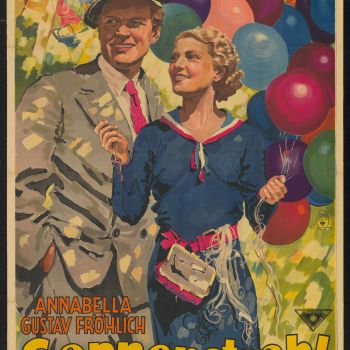
Sonnenstrahl, Germany 1933, directed by Paul Fejos
© Stadt Bocholt (Stadtmuseum Bocholt / Josef Fenneker) -

Der Schimmelreiter, Germany 1933, directed by Hans Deppe and Curt Oertel
© Stadt Bocholt (Stadtmuseum Bocholt / Josef Fenneker) -

Der Verlorene Sohn, Germany 1933, directed by Luis Trenker
© Stadt Bocholt (Stadtmuseum Bocholt / Josef Fenneker) -
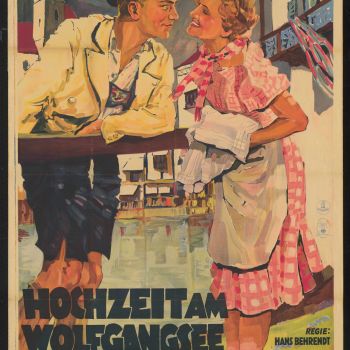
Hochzeit am Wolfgangsee, Germany 1933, directed by Hans Behrendt
© Stadt Bocholt (Stadtmuseum Bocholt / Josef Fenneker) -
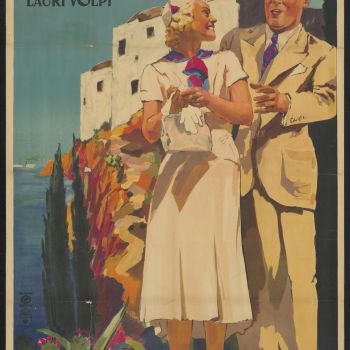
Das Lied der Sonne, Germany 1933, directed by Max Neufeld
© Stadt Bocholt (Stadtmuseum Bocholt / Josef Fenneker) -

Ein Mann will nach Deutschland, Germany 1934, directed by Paul Wegener
© Stadt Bocholt (Stadtmuseum Bocholt / Josef Fenneker) -
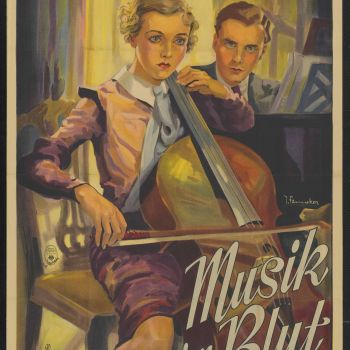
Musik im Blut, Germany 1934, directed by Erich Waschneck
© Stadt Bocholt (Stadtmuseum Bocholt / Josef Fenneker) -
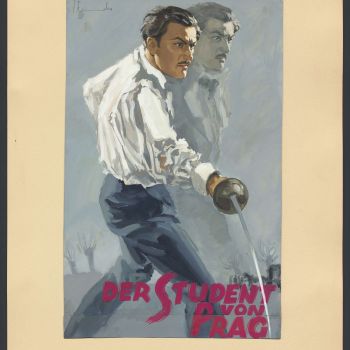
Der Student von Prag (poster design), Germany 1935, directed by Artur Robison
© Stadt Bocholt (Stadtmuseum Bocholt / Josef Fenneker) -

Jugend, Germany 1937, directed by Veit Harlan
© Stadt Bocholt (Stadtmuseum Bocholt / Josef Fenneker) -
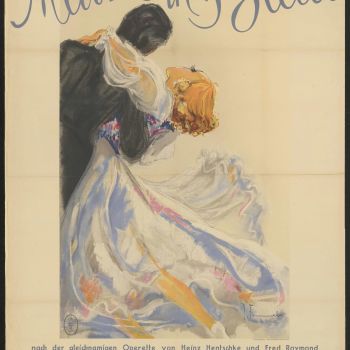
Maske in Blau, Germany 1943, directed by Paul Martin
© Stadt Bocholt (Stadtmuseum Bocholt / Josef Fenneker)